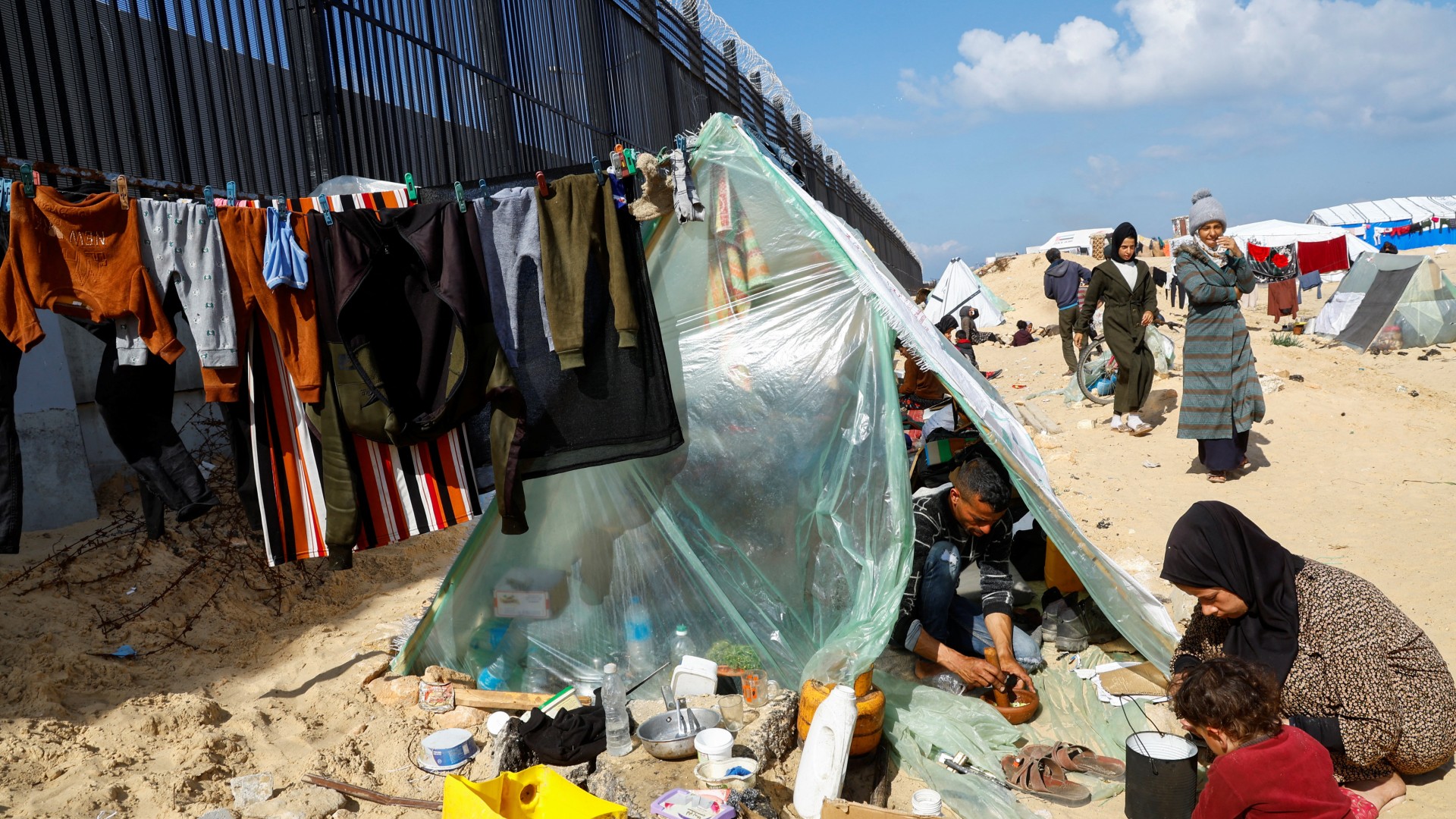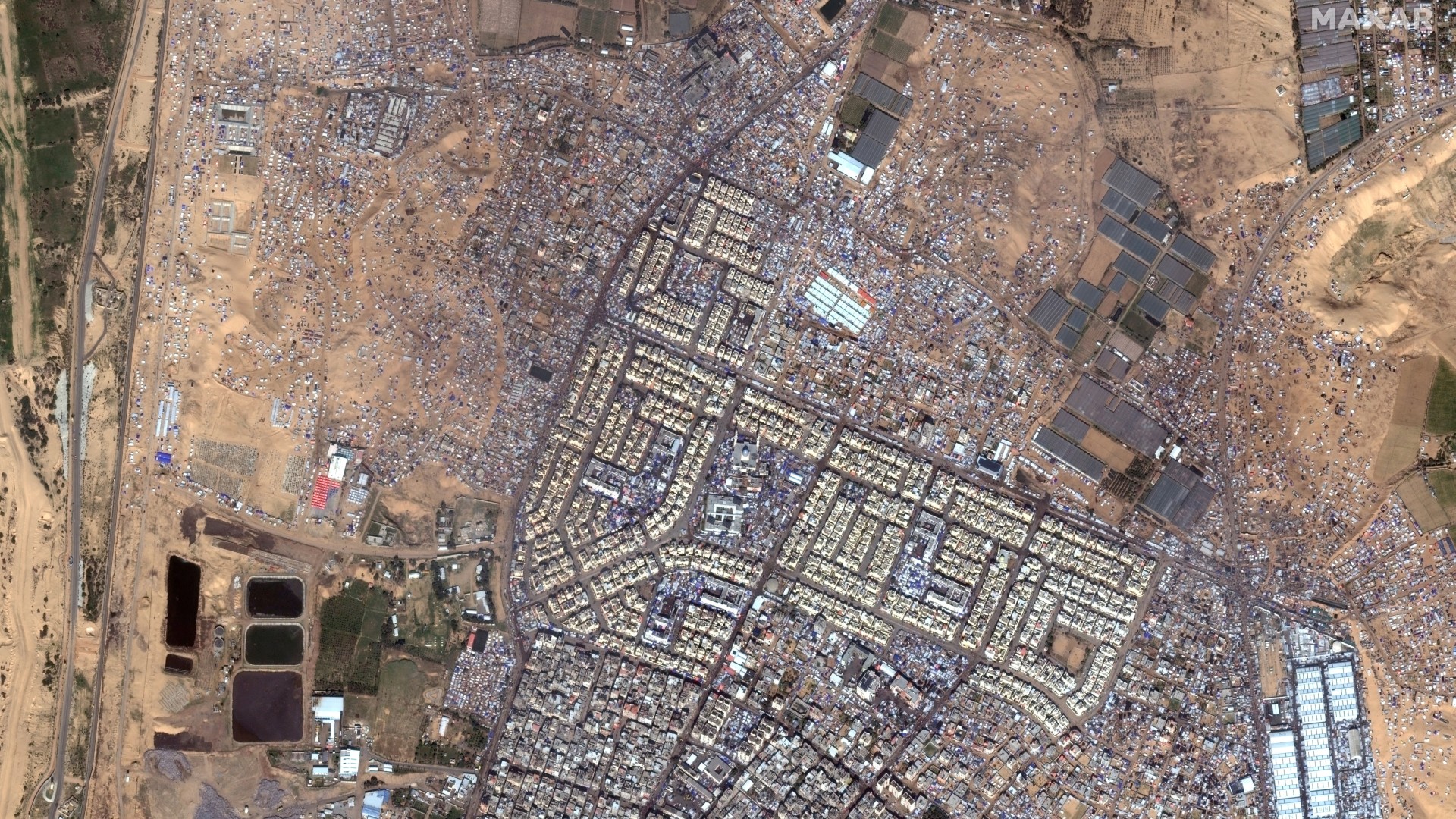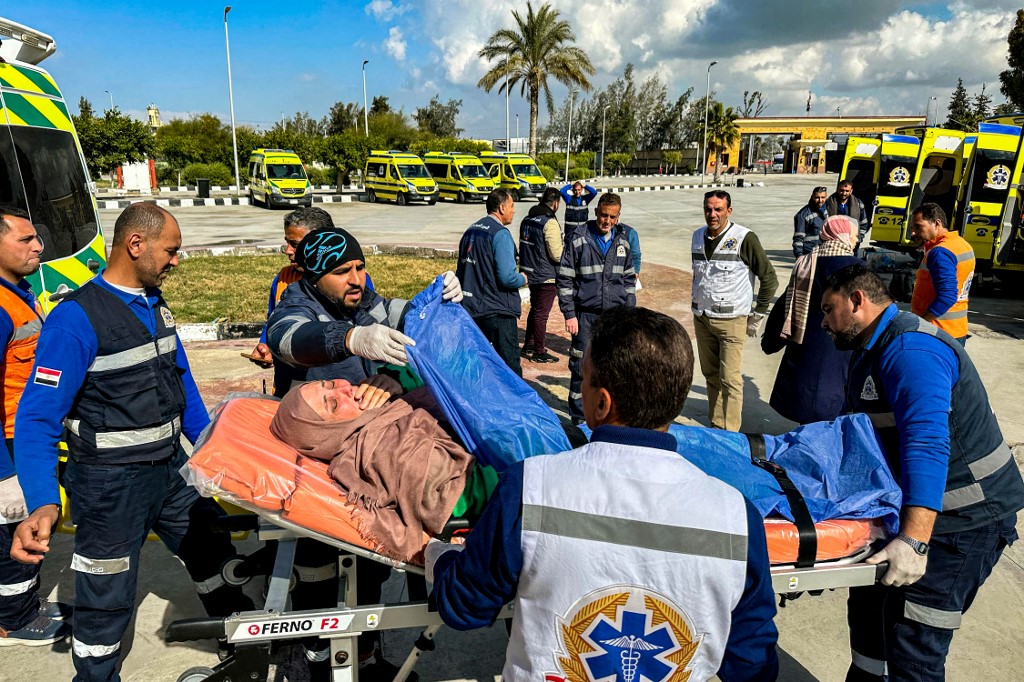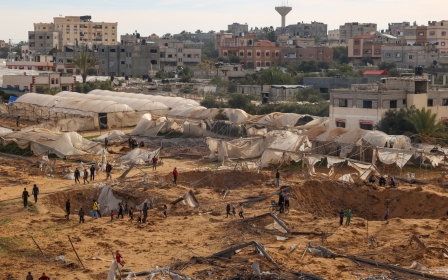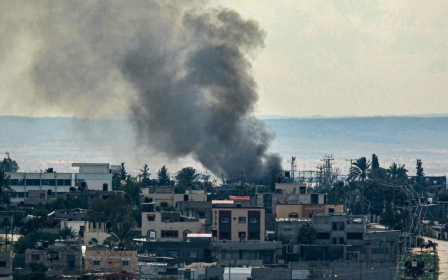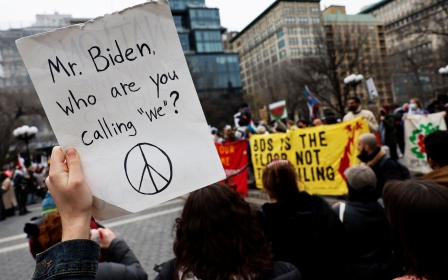War on Gaza: Why Egypt fears Israel's Rafah attack and what it means for their peace treaty
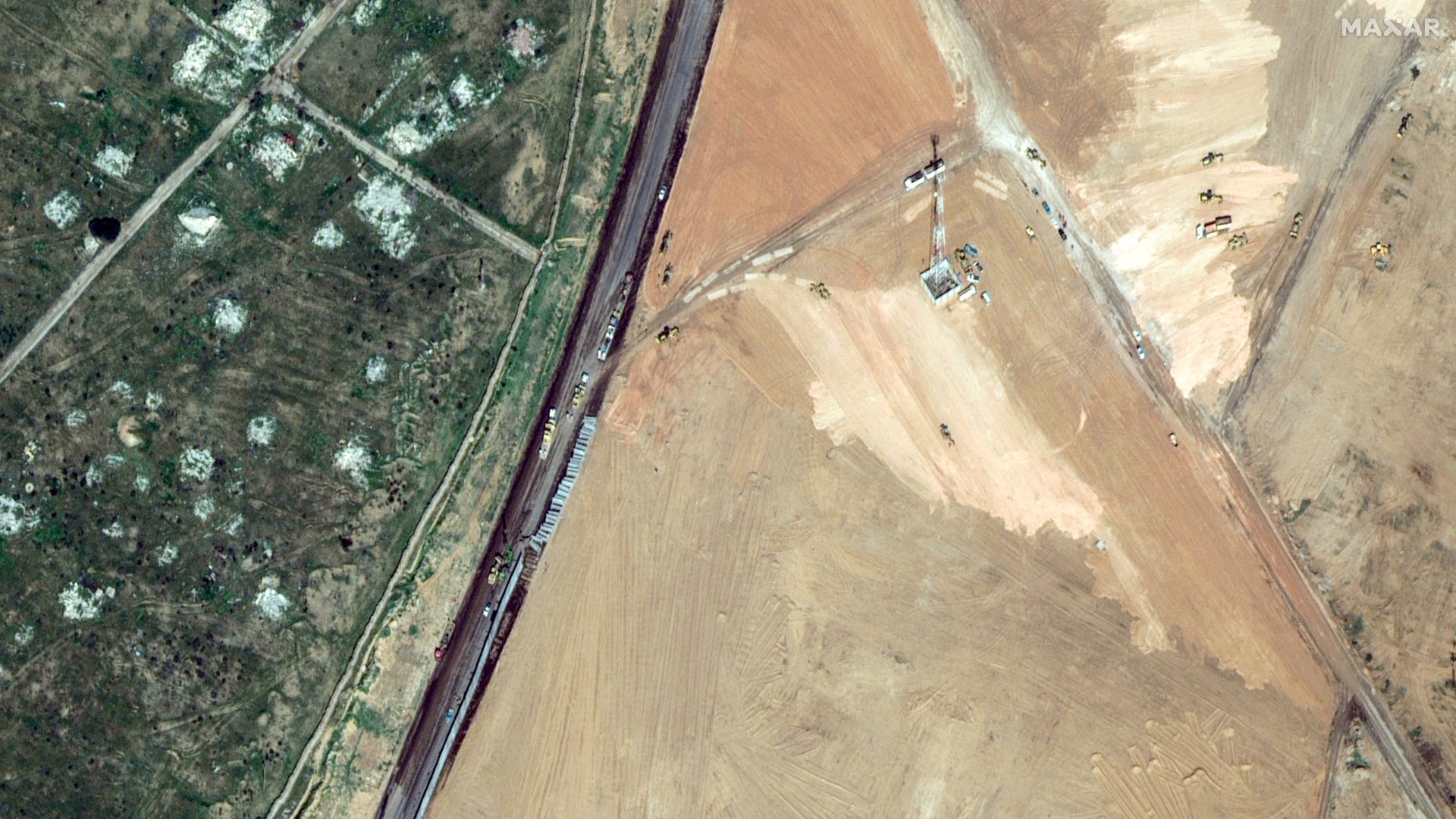
As the Israeli military plans a ground offensive on the Gaza town of Rafah, south of the border Egypt is preparing for the worst - with a humanitarian crisis and threat to its peace treaty with Israel looming.
Rafah is the last refuge for nearly 1.4 million Palestinians fleeing the ferocious Israeli bombardment of the Gaza Strip. Once designated as a “safe zone” for those forcibly displaced by Israel's war on Gaza, it has lately been the target of deadly aerial bombardment by Israeli aircraft and remote-controlled quadcopters.
Prior to the war, the town was home to around 250,000 people. Now, displaced Palestinians, including 600,000 children, are crammed in makeshift tents in an area of just 62 sq km. Aid workers have told MEE that an Israeli land operation on the densely populated area will lead to a humanitarian and healthcare "catastrophe".
Added to this is the prospect of Israeli troops deployed along Egypt's border with Gaza, which anonymous Egyptian sources have previously briefed could have consequences for the peace treaty with Israel - though this was denied by Foreign Minister Sameh Shoukri.
When Israel and Egypt signed their 1979 peace treaty, the town of Rafah found itself divided. Israeli troops withdrew from the Sinai peninsula they had been occupying since 1967, and a border between Egypt and the Gaza Strip was created along the 1906 boundary of Mandatory Palestine, splitting Rafah into two parts: one Egyptian and another Palestinian.
New MEE newsletter: Jerusalem Dispatch
Sign up to get the latest insights and analysis on Israel-Palestine, alongside Turkey Unpacked and other MEE newsletters
One of the main provisions of the treaty was designating four zones in Sinai and Israel as demilitarised. The Egyptian side of Rafah falls within Zone C, which only allows for the deployment of a civilian police force armed with light weapons, as well as UN peacekeepers. On the Palestinian side of the city, a 3km-wide area along the border, known as Zone D, was designated by the 1979 pact as demilitarised.
'The biggest concern of the Egyptian government is the infiltration of militants who will then operate from Sinai and target Israel, giving the Israelis reasons to retaliate'
- Egyptian military source
Israel has allowed exceptions to the demilitarisation of Zone C in Sinai over the past decade, however, with Egyptian President Abdel Fattah el-Sisi's government deploying troops to the area to fight an insurgency.
Key to maintaining peace and security along the border has been the Philadelphi Corridor (also known as Salah el-Din axis): a 14-km long, 100-metre-wide demilitarised buffer zone along the entire border between Gaza and Egypt. Israel, whose troops then occupied Gaza, was given control over the corridor by the 1979 treaty.
Later, following the 2005 Philadelphi Accord and Israel's disengagement from Gaza, the Palestinian Authority took control of the corridor, and since 2007 Hamas has overseen the area.
In January, Israeli Prime Minister Benjamin Netanyahu declared that Israel must reoccupy the corridor. "The Philadelphi Corridor - or to put it more correctly, the southern stoppage point [of Gaza] - must be in our hands," he said.
"It must be shut. It is clear that any other arrangement would not ensure the demilitarisation that we seek."
In response, the Egyptian government said reoccupation of the corridor would violate the peace treaty.
Egypt-Israel agreements
If carried out without Egypt's consent, Israel's control of the Philadelphi Corridor may present a threat to the Philadelphi Accord and the 1979 peace treaty.
Under the Philadelphi Accord, Egypt is allowed to deploy 750 border guards to patrol the border along the corridor for counterterrorism and non-military purposes, including the prevention of smuggling and infiltration across the border.
According to the security annex to the 1979 peace treaty, Israel is only allowed to deploy a limited force of four infantry battalions, their military installations and field fortifications, along with UN observers in Zone D, which includes the corridor. It not allowed, however, to deploy tanks, artillery and anti-aircraft missiles except individual surface-to-air missiles. Any change of these terms would require mutual agreement between Egypt and Israel, according to the treaty.
Djaouida Siaci, an international lawyer, said Israel’s occupation of the Philadelphi corridor and any deployment of tanks there would be a “blatant violation” of the peace treaty.
“It would be considered an illegal occupation of that narrow strip,” she told Middle East Eye.
Mohannad Sabry, a Sinai expert and writer, agreed, saying the reoccupation would be “a full breach” of the treaty's security terms.
Even when Israeli forces occupied Gaza before 2005, the Philadelphi corridor remained a demilitarised buffer zone, Sabry noted.
But, Sabry argues, even if Israel breaches the treaty, a full military confrontation with Egypt is highly unlikely.
“The peace treaty is not going anywhere. As minister Shoukri said, the treaty will remain intact,” he said.
“The back-and-forth statements in the media are for public consumption. What matters is what’s happening behind closed doors, in intelligence coordination meetings in Cairo and other capitals.”
Likewise, Joost Hiltermann, an analyst at the International Crisis Group think tank, said suspension of the treaty “won’t happen”.
“Relations between Israel and Egypt remain strong, despite what is taking place in Gaza.”
'Relations between Israel and Egypt remain strong, despite what is taking place in Gaza'
- Joost Hiltermann, International Crisis Group
According to Sabry, Egypt has done little to confront Israel’s invasion of Gaza, despite nearly 30,000 Palestinians killed and hundreds of thousands more forced to its border.
Egypt’s main concern about a Rafah offensive is the mass influx of Palestinians, rather than its peace with Israel, he said.
“The reoccupation of Rafah, including or not including the Philadelphi Corridor, has not been refused per se,” Sabry said. “It’s accepted under certain circumstances.”
For Egypt and the United States, an Israeli assault on Rafah, where it says four Hamas battalions are based, would be acceptable as long as there is somewhere for Palestinian civilians to safely flee to.
“This is the only condition," Sabry said.
Buffer zone
Indeed, where Palestinians will be able to flee to if Israel moves into Rafah is a burning question for Egypt and the international community. There are indications that Egypt is preparing for an influx of refugees.
On Wednesday, the Sinai Foundation for Human Rights said Egyptian authorities are preparing a 10 km buffer zone to receive displaced Palestinians.
Contractors working on the project told the independent rights group that work is being carried out under the supervision of the Armed Forces Engineering Authority, predicting it will be completed within 10 days.
Satellite images released on Thursday showed the construction of a concrete wall along the border. The Wall Street Journal reported that authorities are building an 8 sqm "walled enclosure" to accommodate up to 100,000 Palestinians. A large number of tents have been delivered to the site, the newspaper added.
A military source, speaking to MEE on condition of anonymity, confirmed the Sinai Foundation's report, but denied that Egypt would accept a “mass influx of Palestinians”.
He said the construction is “to create a centralised area to limit infiltration of militants into Sinai and prepare for the worst.”
The source noted that such a scheme is not new, and something similar was created following Egypt's 2014 war on militant groups in north Sinai. “What is new is securing it with higher walls and installing well-guarded gates for entry and exit,” he said.
“There is a difference between accepting the displacement and getting ready in case the worst happens.”
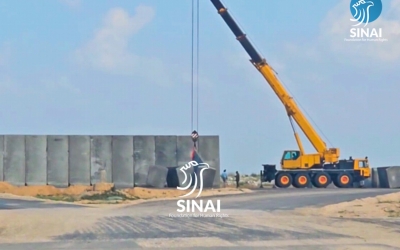
Sabry, the Sinai expert, said however that there are “extremely strong signals that Egypt has already reached a semi-finalised agreement on receiving the Palestinians of Gaza either in part or in full”.
“This will be revealed within the coming days,” he said.
Egypt has faced an influx of Palestinians from Gaza before. In January 2008, Gaza was facing a humanitarian crisis caused by Israel's siege of the enclave, exacerbated by Egypt's closure of the Rafah crossing.
In response, Palestinians destroyed a section of the barrier along the border, allowing nearly half the population of Gaza to cross into Egypt seeking food and essential supplies.
Hosni Mubarak, then president of Egypt, ordered troops not to attack the Palestinians.
“As the situation is very intense, Egypt is taking all necessary measures and looking into all scenarios,” the military source told MEE.
“The state does not want to repeat what happened in 2008, where chaos in the Gaza Strip led to hundreds entering Egypt undocumented and unregulated, endangering their lives and the security of Egypt.”
The source said that Cairo is aware that Palestinians will either flee north or towards Egypt if Israel attacks Rafah.
“This area currently being prepared might be a secure space to allow the Egyptian authorities to continue providing humanitarian assistance to the displaced and allow Egyptian police to scan identification documents,” he said.
“The biggest concern of the Egyptian government is the infiltration of militants who will then operate from Sinai and target Israel, which would then give the Israelis reasons to retaliate.”
Sabry said there are no indications of a major destabilisation in relations between Egypt and Israel since the war on Gaza began.
“Egypt has so far succumbed to every Israeli condition,” he said. “Look at the aid, for example. Egypt has been told to not send aid directly to Gaza and not break the siege, and Egypt accepted. They sent the aid through Nitzana and al-Awja [40km south of Rafah] to be checked first by the Israelis and then the Israelis decide if aid goes in.”
He also pointed out that Israel has to sign off on the names of wounded Palestinians, as well as ordinary travellers, before their evacuation to Egypt.
“The only thing that actually has been proven that Egypt has done is profiteering from the aid shipments and transports,” he said, referring to revelations by MEE that an intelligence-linked firm charges aid groups thousands of dollars to get aid into Gaza.
Middle East Eye delivers independent and unrivalled coverage and analysis of the Middle East, North Africa and beyond. To learn more about republishing this content and the associated fees, please fill out this form. More about MEE can be found here.


